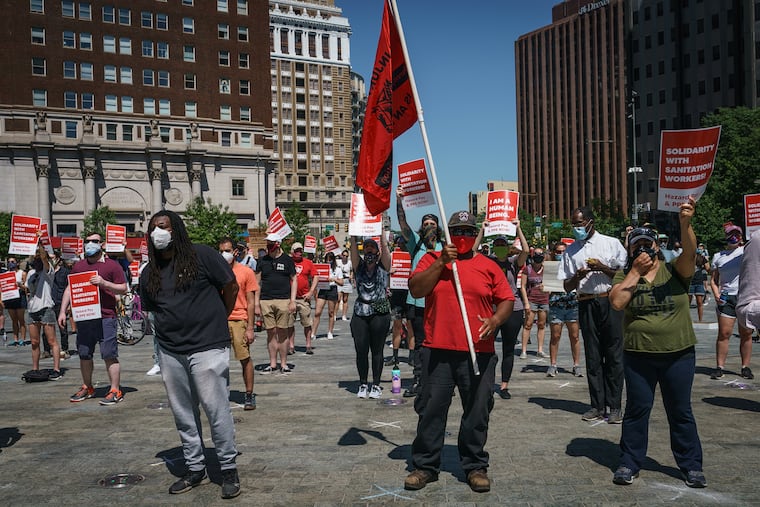Workers aren’t calling out unsafe coronavirus conditions for fear of losing their jobs. A Philly bill could help.
The bill tackles an urgent issue, advocates say, with more people returning to work as Philadelphia allows businesses to re-open and fears of a second wave mount.

For every essential worker who has sounded an alarm about unsafe coronavirus-era working conditions, many more stay quiet, for fear of losing their jobs or drawing other retaliation for speaking out.
A Philadelphia City Council bill aims to change that.
The bill, introduced by Councilmember Helen Gym and supported by more than two dozen labor groups, would make it illegal for employers to retaliate against staffers who refuse to work in conditions that expose them to the risk of the coronavirus and who speak out about their experiences.
The measure would give some teeth to city and state health orders regarding how businesses should protect their workers during the pandemic. As such, it’s likely to draw criticism from the business community.
The bill tackles an especially urgent issue, advocates say, with more people returning to work as Philadelphia allows businesses to reopen and worry about a second wave of infections mounts.
Monique Atkinson, a home health aide who has asthma, said she isn’t getting the personal protective equipment she needs. Atkinson, who lives in Germantown and is a member of the worker group One Pennsylvania, says she’s lost work over bringing up her concerns.
“As essential workers, we deserve protection from retaliation when we bring up safety issues,” she said.
» READ MORE: Philly unions are calling for a citywide essential worker bill of rights during the coronavirus pandemic
Workers say they fear losing their jobs, having their hours cut, or being threatened with calls to immigration officers if they report dangerous conditions. Those fears don’t affect all workers equally: Those without union backing and who make low wages are more inclined to stay silent for fear of retaliation. Black workers, too, were more likely to experience or witness retaliation for speaking up about unsafe COVID-19 conditions than their white counterparts, according to a report from the National Employment Law Project (NELP) published Tuesday.
“Our survey shows two parallel dynamics are at play," said Irene Tung, lead author on the NELP study. “Vocal workers are being punished, and other workers are staying quiet to avoid job repercussions."
Proponents of the bill, led by the union Unite Here, frame the bill as a public health measure rather than a worker safety measure. If workers fear speaking up about risky conditions, infections could spread throughout a workplace and lead to entire communities catching the virus, said Unite Here analyst Dermot Delude-Dix. This played out in towns like Sioux Falls, S.D., which became a coronavirus hot spot after hundreds of meatpacking workers tested positive.
Industry groups have raised concerns about the bill, Delude-Dix said, but he declined to share specifics. The Greater Philadelphia Chamber of Commerce said it was surveying its members on the bill in order to comment on it. The Pennsylvania Restaurant and Lodging Association did not respond to a request for comment.
The Kenney administration supports the bill, said spokesperson Lauren Cox, though it has some concerns about parts of it, such as how the bill allows a worker to sue an employer “even if it is determined that their violation of health protocols was unintentional.”
“We look forward to continuing to work with Council to ensure Philadelphia workers are protected without adding unintended consequences for small businesses that are already struggling in the wake of this public health and economic crisis,” Cox said.
The bill builds on the demands made by a coalition of Philly labor groups in April when they called for protections for essential workers, including whistle-blower protection.
The bill is also part of a recent trend of Philadelphia passing cutting-edge worker legislation that seeks to protect workers who are not unionized. Enforcement and awareness, however, have been hurdles to the effectiveness of these laws, though the city, pressured by advocates, has sought to improve enforcement capabilities in the last year. And the chamber of commerce has largely opposed these measures, saying they are unfriendly to business and constitute government overreach.
» READ MORE: Philly is now publicly shaming ‘bad actor’ businesses that break the city’s labor laws
City Council’s last session is on June 25. If the bill is to become law this summer, while Philadelphia is in the “yellow" recovery phase, it must be approved by Council’s Committee on Law and Government and then approved by Council by its last session. If not, it could be reconsidered in the fall. The bill has nine co-sponsors, a majority on Council, said Greg Windle, Gym’s spokesperson.
Council’s Committee on Law and Government will hold a hearing on the bill Friday.